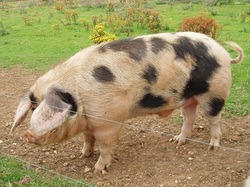
One of my favorite books of all time is Animal Farm by George Orwell. If you were to read the book without any background knowledge you would consider it an amusing story of animals overthrowing their owners and then becoming corrupt. However if you understand the historical context and deeper layers of meaning present in the story you can appreciate the book at a much deeper level. The book is not just a story about animals it is a metaphor for communism.
In this week's Parsha Rivkah becomes pregnant, during her pregnancy she experiences a great commotion in her belly. This was beyond normal morning sickness, so she asked God what was going on with her baby. (They had no sonograms back then) God told her you have two nations inside you struggling with each other.
The story of Rivkah and her babies as well as everything in the Torah is literal, it is historical fact. Concurrent with this historical truth we must also understand that everything in the Torah is metaphoric. Acknowledging the deeper layers gives us a richer more complex appreciation for the Torah and its practical messages for the good life.
Seth Heuristic gives an analogy. If we are given a poem or a painting and we are told it is done by an 8 year old we are not going to analyze it and see insights that we would find from the same piece if we are told it was done by Shakespeare or Jackson Pollack. In order to see it we have to believe it is their.
Rifkah is told she has two opposing forces within her, one on good and one evil. Literally she had two sons in her that were fighting with each other. On a deeper more metaphoric level we all consider ourselves one untied front however, all of us have inside ourselves two opposing forces constantly batteling each other, one good and one evil.
This deeper message is eternal and has practical value, we all have internal struggles no matter who we are and we must all face tests, this is A lesson the Torah wants us to take away from the story, if we read the Torah as a book of stories and stop their we are missing the point.
In this week's Parsha Rivkah becomes pregnant, during her pregnancy she experiences a great commotion in her belly. This was beyond normal morning sickness, so she asked God what was going on with her baby. (They had no sonograms back then) God told her you have two nations inside you struggling with each other.
The story of Rivkah and her babies as well as everything in the Torah is literal, it is historical fact. Concurrent with this historical truth we must also understand that everything in the Torah is metaphoric. Acknowledging the deeper layers gives us a richer more complex appreciation for the Torah and its practical messages for the good life.
Seth Heuristic gives an analogy. If we are given a poem or a painting and we are told it is done by an 8 year old we are not going to analyze it and see insights that we would find from the same piece if we are told it was done by Shakespeare or Jackson Pollack. In order to see it we have to believe it is their.
Rifkah is told she has two opposing forces within her, one on good and one evil. Literally she had two sons in her that were fighting with each other. On a deeper more metaphoric level we all consider ourselves one untied front however, all of us have inside ourselves two opposing forces constantly batteling each other, one good and one evil.
This deeper message is eternal and has practical value, we all have internal struggles no matter who we are and we must all face tests, this is A lesson the Torah wants us to take away from the story, if we read the Torah as a book of stories and stop their we are missing the point.
 RSS Feed
RSS Feed